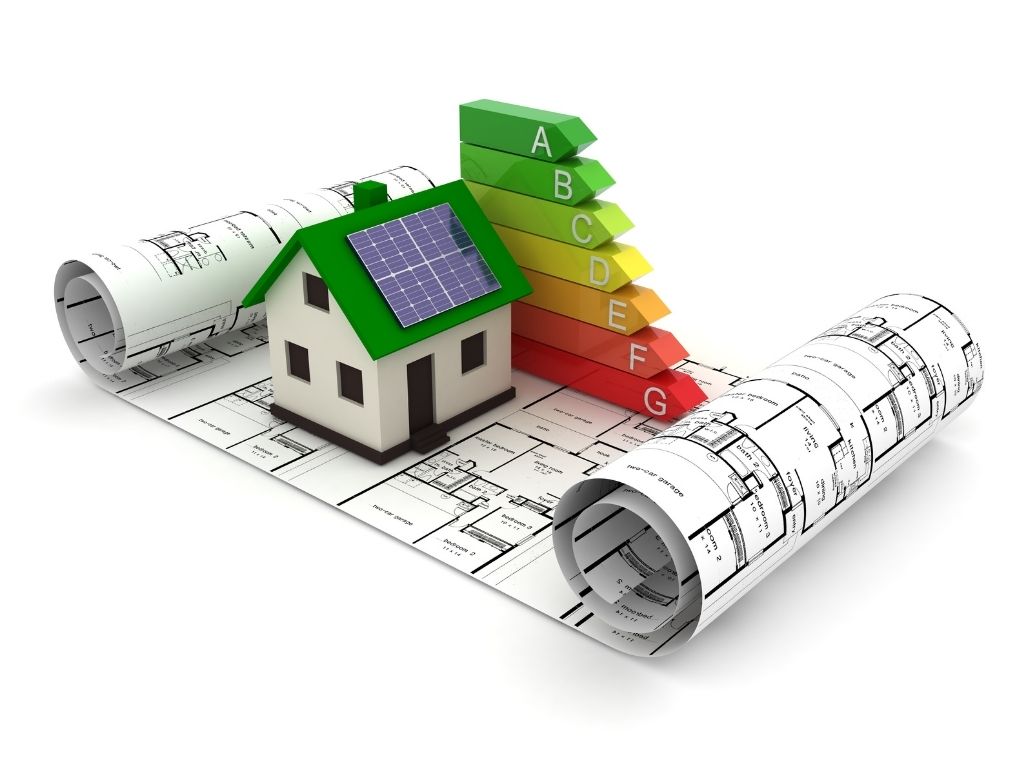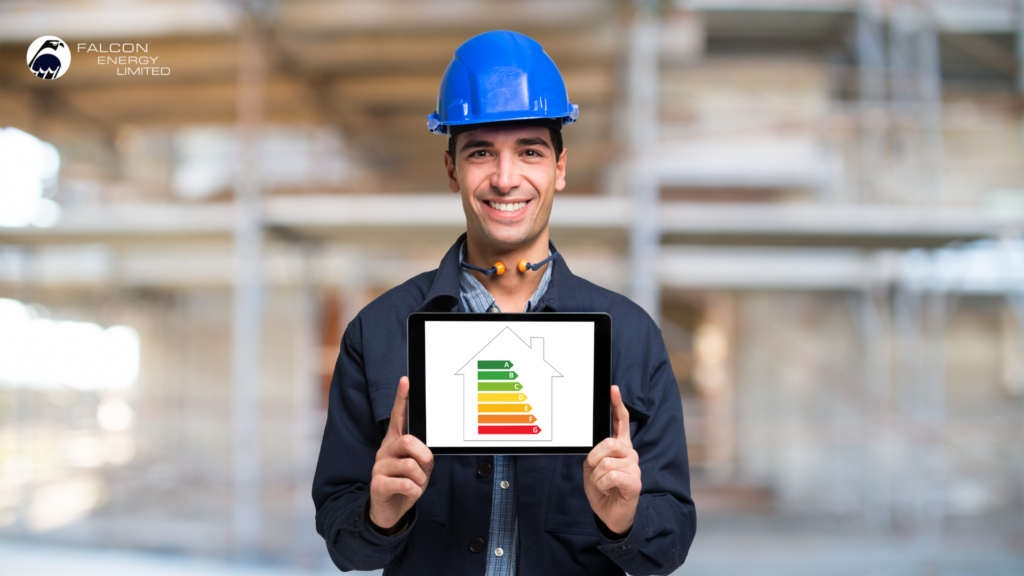
Whether you’re a homeowner, landlord, or business owner, understanding the energy performance certificate (EPC) process is essential for improving your property’s energy efficiency and reducing energy bills. If you’re preparing to sell, rent, or even upgrade your property, you’ll likely need an EPC certificate, but how much does an EPC cost?
In this guide, we’ll look at the current EPC certificate cost in 2025, what factors influence pricing, and how to ensure you stay compliant with legal requirements while getting the best value.
At Falcon Energy, we provide professional EPC assessments and certificate services across the UK. Please email us or call 01403 253439 for a free, no-obligation quote.
What is an EPC Certificate?
An Energy Performance Certificate (EPC) provides an official energy rating for a property, graded from A (highly efficient) to G (least efficient). It measures the property’s overall energy performance and includes tailored suggestions to help improve energy efficiency and reduce energy consumption.
A valid EPC includes:
-
A visual EPC rating graph
-
Estimated energy usage and typical energy costs
-
Suggestions for energy efficiency improvements
-
The building’s total floor space and current heating systems
EPCs are produced by accredited domestic energy assessors or qualified assessors for commercial properties. The final EPC report helps property owners, landlords, and prospective buyers understand the carbon emissions and running costs of a building.
Discover our expert EPC services at Falcon Energy.
How Much Does an EPC Certificate Cost in 2025?
Residential EPC Certificate Cost
The average EPC cost for a residential property in 2025 ranges from £60 to £120, depending on the property’s size, type, and location. EPC prices for homes vary slightly by region and can increase for larger houses with complex layouts or older construction.
At Falcon Energy, our standard local EPC price starts from £75 + VAT, offering great value for a professionally delivered, compliant service; however, it is dependent on the location and size of the property. Our domestic energy assessors are highly experienced and fully accredited, ensuring accurate and trustworthy results.
Commercial EPC Certificate Cost
For commercial buildings, the energy performance certificate cost is generally higher due to the increased complexity of the assessment. Commercial EPC prices typically range from £150 to over £500, depending on the building’s size, layout, usage, and location.
Factors such as the number of floors, electrical installation condition, and total floor space can impact the EPC assessment time and cost. For larger or mixed-use buildings, additional fees may apply.
When you get in touch, we will provide clear, competitive quotes for commercial EPCs across the UK.
What Factors Affect the EPC Certificate Cost?
The cost of an EPC certificate can vary depending on several key factors:
1. Property Size
The more rooms, bedrooms, and overall floor area a property has, the more time the energy assessor needs to complete the evaluation.
2. Property Type
Newer properties often take less time to assess compared to older homes or listed buildings, which may require more detailed checks of the insulation present, room heaters, and heating controls.
3. Location
EPC costs in London and other major cities may be slightly higher due to demand and travel time, while local EPCs outside urban areas may offer more cost-effective pricing.
4. EPC Provider
Choosing a qualified, accredited provider like Falcon Energy ensures compliance and accuracy without unexpected higher fees. All valid EPCs in the UK must be carried out by accredited assessors in person. If someone offers an EPC without a site visit, it’s likely non-compliant and invalid.
Is an EPC Certificate a Legal Requirement?
Yes, an EPC is a legal requirement in the UK for most property transactions. You’ll need a valid EPC if:
-
You are selling a property
-
You are letting to new tenants
-
You are marketing a rental property to potential tenants
-
You are constructing a new residential or commercial building (typically assessed via SAP methodology before an EPC is issued)
-
You are applying for government grants to improve energy efficiency
Some exemptions apply, such as certain temporary buildings and listed buildings – though listed building exemptions only apply if energy improvements would unacceptably alter the property’s character.
Failing to provide an EPC when required can result in penalties up to £5,000, depending on the property type.
How to Get an EPC Certificate
Getting an EPC is quick and easy with Falcon Energy. Here’s how to get started:
-
Request a quote – Call or submit your details online.
-
Arrange a visit – We’ll book a convenient time for an accredited domestic energy assessor to inspect your property.
-
Have the site assessment – Our EPC assessment includes checks of heating systems, loft insulation, windows, and more.
-
Receive your EPC – You’ll receive a certificate with your home’s EPC rating, recommendations, and validity period.
Don’t hesitate to book your EPC assessment with Falcon Energy today. We have experienced and highly skilled energy assessors working nationwide.
How to Save Money on Your EPC
While EPC prices are relatively affordable, there are still a few ways to keep costs down:
-
Choose a local EPC provider to reduce travel costs.
-
Book multiple properties together (ideal for landlords or estate agents).
-
Check if your property has a valid EPC before ordering a new one (EPCs are valid for 10 years).
-
Avoid online-only services that lack in-person EPC assessments.
Beyond the initial EPC cost, you can also make long-term savings by implementing the recommendations in your EPC report. Improvements like external wall insulation, energy-efficient lighting, or upgraded heating controls not only boost your home’s energy efficiency but can also lead to lower energy bills and a better EPC rating. Over time, these changes can help reduce carbon emissions and increase your property’s appeal to prospective buyers or tenants.
Book Falcon Energy’s EPC Services
Whether you’re looking to sell, rent, or improve your home’s energy efficiency, Falcon Energy offers fast, professional EPC assessments at competitive prices.
Why choose Falcon Energy?
-
Local EPCs from £75 + VAT
-
Fully accredited and experienced energy assessors and domestic energy assessors
-
Clear, accurate reporting
-
Available nationwide for residential and commercial properties
-
Quick turnaround and transparent pricing
Our team helps make it straightforward to meet EPC requirements, identify areas to improve energy efficiency, and understand your property’s energy usage. Book your EPC assessment today or contact us for more information about our EPC services.

FAQs
How long does an EPC last?
An EPC is valid for 10 years from the date of issue. You’ll need to renew it if you sell or let the property after that period.
Who pays for the EPC?
The property owner – usually the seller or landlord – is responsible for arranging and paying for the EPC before listing a property.
Can I get a free EPC certificate?
Occasionally, energy grant schemes include a free EPC, but generally it’s a paid service. Always check eligibility.
What does the EPC assessment cover?
The assessment includes the building’s structure, insulation, heating system, lighting, windows, and the property’s energy usage to produce a final EPC score and improvement suggestions.
How long does an EPC assessment take?
For a standard residential property, an EPC assessment typically takes 30 minutes to 1 hour. Larger homes or more complex commercial buildings may take longer.
Read our guide on ‘What Do EPC Ratings Mean?‘
